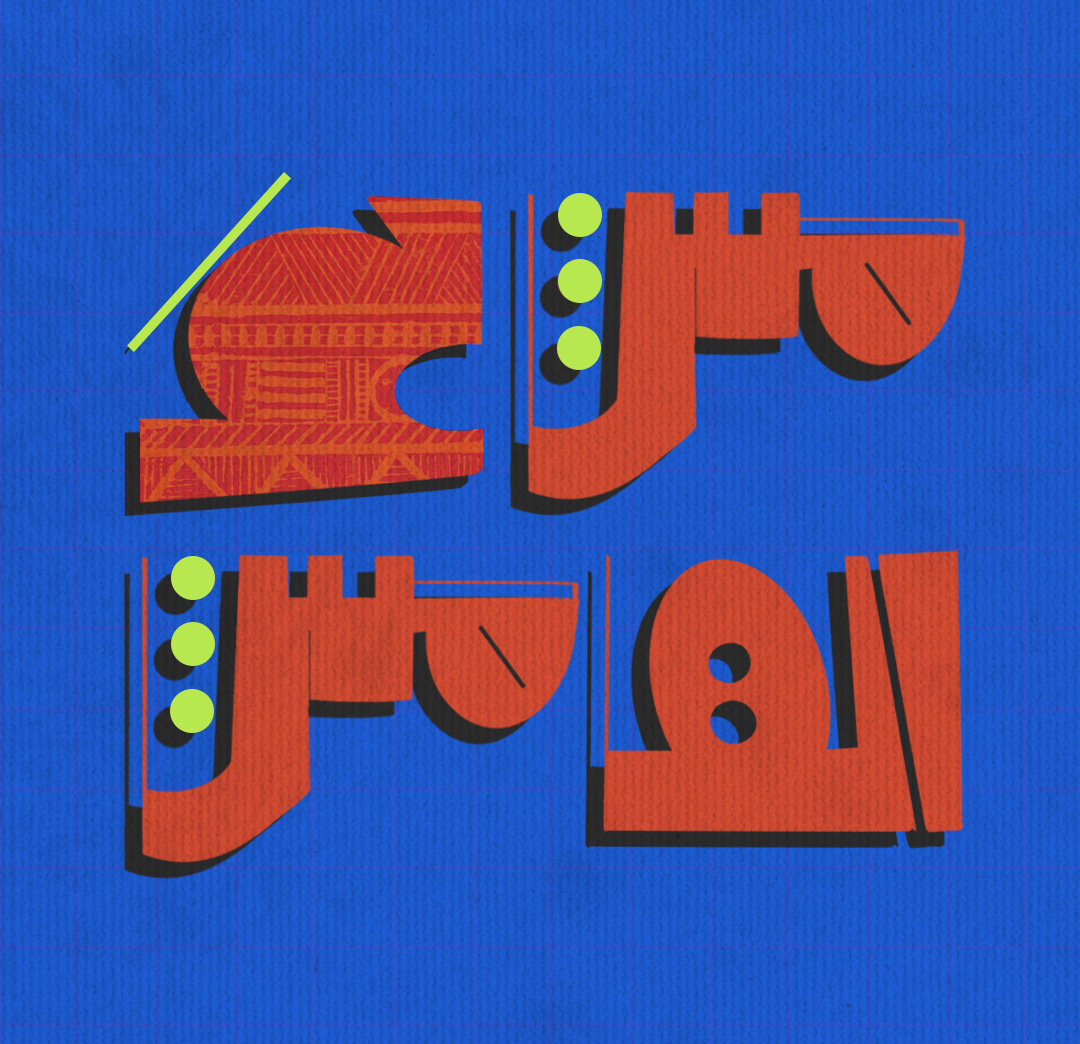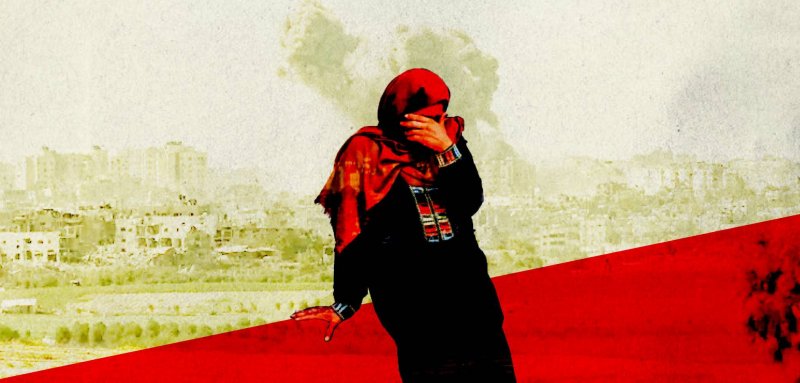
This report comes as part of the "Not on the Margins" project, which sheds light on freedoms, and sexual and reproductive health and rights in Lebanon
For over 55 days, the people of Gaza have been suffering from continuous blockades, bombardments, and massacres by the Israeli occupation army. The death toll continues to rise, claiming the lives of men, women, and children. Amidst this horror, Gaza’s pregnant women face a different set of dangers. According to the United Nations Population Fund (UNFPA), Gaza is home to 50,000 pregnant women, 5,500 of which are on the verge of giving birth.
These women are constantly exposed to the possibility of miscarriage, premature birth, or –until the temporary ceasefire that came into effect a few days ago– giving birth under the shelling. At the borders, aid trucks line up, waiting their turn to enter Gaza and help with relief. Some of these trucks, however, lack the necessary medical supplies needed by pregnant women.
Essential medical supplies
Across social media, videos emerging from Gaza are labeled as ‘sensitive content’. One such video captures the final moments of a pregnant woman's life and the first moments of her unborn child. The woman, eight months pregnant, was in her home when it was bombarded. Her family rushed her to the hospital. Through an emergency cesarean section, the fetus was saved although the mother lost her life.
Among the 50,000 pregnant women currently in Gaza, a significant portion faces the risk of miscarriage due to the psychological trauma of being forcibly displaced from their homes amid shelling.
According to the United Nations Population Fund (UNFPA), Gaza is home to 50,000 pregnant women. 5,000 are due to give birth imminently. They are constantly exposed to the possibility of miscarriage, premature birth, or giving birth under the shelling.
Liqaa Al-Saadi, a Palestinian woman living with her family in Khan Yunis, tells Raseef22, “Many pregnant women have lost their lives, and others have lost their babies. Those who have given birth cannot experience a normal postpartum period.”
She adds, “These heavily pregnant women and new mothers are in shelters, in schools or camps, with very limited access to food and water. These families have fled home in order to save their lives, and are not carrying any money, clothes, or the essentials for newborn babies.”
More is needed than clothing and milk for infants, or the presence of medical staff or midwives to assist women in childbirth. There are certain essential medical supplies necessary for childbirth or a miscarriage.
Raseef22 spoke with Iffat Al-Sayrafi, an obstetrician and gynecologist. She emphasized that natural childbirth is never simple, not even in hospitals under medical supervision. “There is always a need for specific postpartum medications and the strict sterilization of tools to ensure the health of the mother and the fetus.”
She noted that although for many pregnant women in Gaza, giving birth at a hospital is no longer an option, “nonetheless, there are medical necessities that must be ensured.”
Dr. Al-Sayrafi separates medical needs into two categories: in the case of natural childbirth and in the case of miscarriage.
Necessary equipment and supplies for natural childbirth:
Sterilization materials for tools
Postpartum antibiotics
Sanitary pads for postpartum use
Methergine to stop bleeding after childbirth
Medications to assist uterine contraction and return it to its normal state
Panthenol, Fucidin, and other ointments to prevent infection of the birth wound
Necessary equipment and supplies in the event of miscarriage:
Medications to stabilize pregnancy in the event of early miscarriage, such as progesterone compounds
Blood-thinning medications to stabilize pregnancy in critical cases where fetal death occurs
Antibiotics in addition to methergine to stop bleeding, uterine cleaning, and sanitary pads
Dr. Al-Sayrafi points out the heightened risk of gestational diabetes and high blood pressure among many pregnant women, “these women need special medical care during pregnancy, and the critical situation in Gaza may exacerbate the consequences of these diseases.”
Sanitary pads are not a luxury
Tweets have been circulating about the need for sanitary pads in Gaza, which likely escaped the attention of those preparing aid and supply packages. Some women have resorted to using birth control pills to delay their menstrual cycle amidst continuous bombing.
Feminine products, whether sanitary pads or necessary medication for childbirth, should not be a luxury. Aya Mounir, activist and director of the 'Superwoman Initiative', told Raseef22, “Feminine products are not included in the lists of supplies sent to conflict zones, areas facing climate or natural disasters, or to Gaza. Women's supplies, ranging from sanitary pads and menstrual pain relievers to the specialized medications to stop bleeding in the event of miscarriage, are overlooked.”
Tweets have been circulating about the need for sanitary pads in Gaza, which likely escaped the attention of those preparing aid and supply packages. Feminine products, whether sanitary pads or necessary medication for childbirth, should not be a luxury.
Mounir explains that when some of these supplies are finally sent, they are often insufficient. “We reached out to the Mersal Foundation. However, at the moment, we do not know if we will be able to provide more than just sanitary pads, postpartum pads, and medications to stop bleeding. We do not have the capacity to include more essentials for pregnant or miscarrying women.”
Collecting aid
Aya Mounir expresses feelings of helplessness, a sentiment shared by many, and exacerbated by the lack of ease relief trucks entering Gaza face. At the border, enormous amounts of aid and supplies are gathered but may not reach those who urgently need them.
The Superwoman Initiative is working with the Mersal Foundation, Safe Haven Foundation, Y-Peer Egypt, and Aware Foundation for Development and Equality to collect certain of the necessary supplies needed by pregnant women in Gaza. Subsequently, a new list has been added to the relief convoys. This collaboration between organizations was initiated by Egyptian blogger and content creator Jannah Adel, who connected Aya Mounir and the Mersal Foundation to other relevant organizations.
Adel explains her participation in this initiative, “Like many others, I keep up with what is happening in Gaza on social media. After reading a tweet about the increase in miscarriages and premature births due to bombings, and considering the water and medical disruptions, I thought about the women there, as they go through menstruation and childbirth, against a backdrop of war.”
Mersal Foundation has already sent sanitary pads in a first convoy, while the Red Cross has allocated a kit for women's health supplies. However, considering the number of women in Gaza, the ongoing war, and the continuous childbirth, these supplies are insufficient.
Childbirth is neither easy nor straightforward under normal circumstances, requiring strong medical care and psychological support. There is much research on the trauma of childbirth and its long-term impacts on mothers. What the women of Gaza are suffering is unimaginable, and we remain hopeful that specialized medical supplies and hygiene products will reach them.
Raseef22 is a not for profit entity. Our focus is on quality journalism. Every contribution to the NasRaseef membership goes directly towards journalism production. We stand independent, not accepting corporate sponsorships, sponsored content or political funding.
Support our mission to keep Raseef22 available to all readers by clicking here!
Interested in writing with us? Check our pitch process here!



